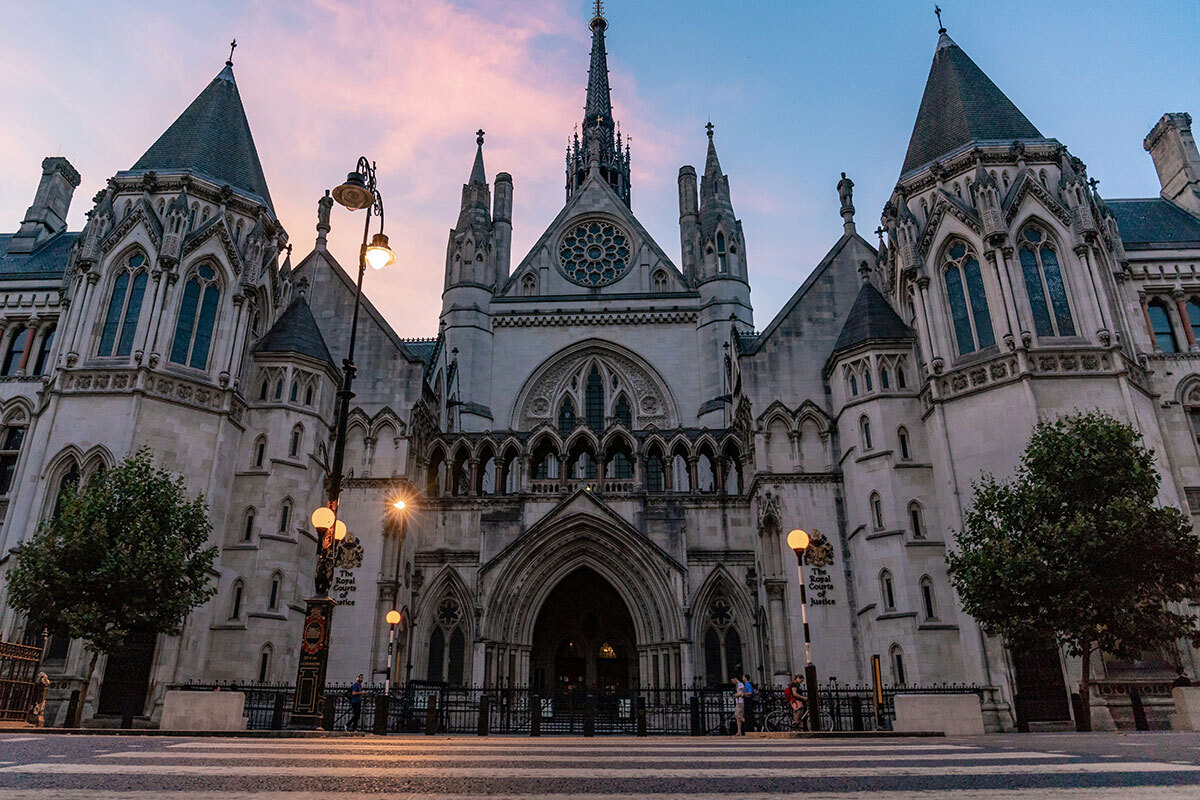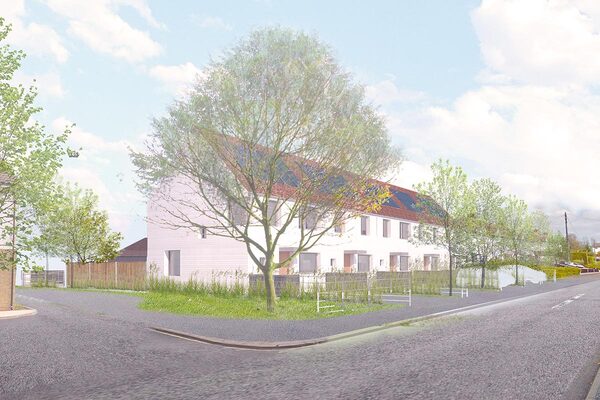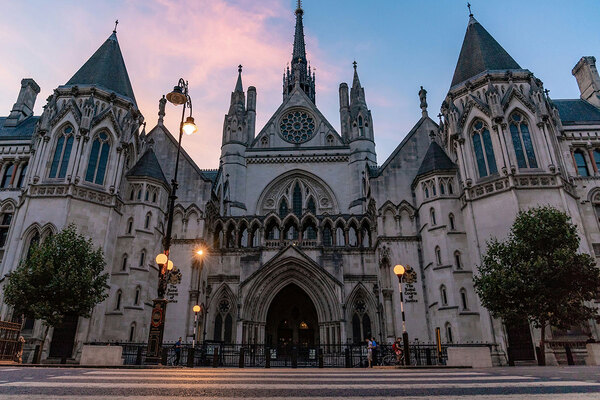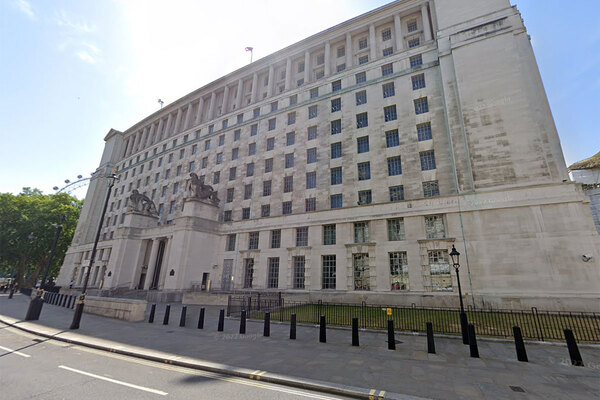You are viewing 1 of your 1 free articles
Government defends acting unlawfully over green-homes policy in High Court
In a High Court judicial review this week, government lawyers admitted a minister acted with “limited” unlawfulness when setting energy-efficiency standards for new homes.

A legal representative of the Department for Levelling Up, Housing and Communities (DLUHC) said “there was an oversight”, in that the minister “was not presented with information” on the environmental assessment of a policy. “To that limited extent, unlawfulness is accepted,” they said.
The department was facing a legal challenge by campaigners who claimed it was restricting councils’ right to set higher green standards for new homes.
Rights Community Action (RCA) had previously argued that guidance to councils published in December by DLUHC minister Baroness Penn amounted to a “green-homes roadblock”.
The judicial review, launched by the campaign group and the Good Law Project, a non-profit law firm, was heard in the Royal Courts of Justice on Tuesday 18 and Wednesday 19 June.
Government lawyers argued that Baroness Penn’s statement, which limits councils from bringing in local energy standards that go beyond forthcoming building regulations, was “lawful and conventional” and intended to “facilitate the transition” to the Future Homes Standard, a set of stricter green guidelines due to come into force next year.
RCA’s lawyers said that although the Future Homes Standard would “raise the floor” by setting minimum standards, the minister’s statement “lowered the ceiling” by setting the maximum standards councils could ask for, thus hindering their net-zero ambitions.
The case could affect local authorities such as Wirral and Bristol, which are currently going through the local-plan examination process. It will determine whether they can demand green standards from developers that are higher than the Future Homes Standard.
In court on Tuesday, Alex Goodman KC, representing RCA, argued the minister’s statement was unlawful because she did not assess the environmental impact of the guidance, which is a requirement under the government’s own Environment Act 2021.
The court heard that Baroness Penn “did not have regard” to an environmental assessment when she published the guidance in December, although civil servants had prepared a document which could be used as part of one.
On 22 February, two months after the statement was published, officials presented the minister with a new assessment and asked her to revisit the guidance.
The following day, Baroness Penn confirmed she was happy not to change the statement. Housing minister Lee Rowley also agreed not to change the guidance on 19 March.
“You have here a rearguard or retrospective attempt to demonstrate compliance,” Mr Goodman said. Ministers must assess the environmental impact of policies and “not merely do it as a rearguard action”, he argued.
Ned Westaway KC, representing the DLUHC, admitted “there was an oversight”, in that the minister “was not presented with information” on the environmental assessment.
“To that limited extent, unlawfulness is accepted,” he said. However, since the guidance was later approved by another minister in light of an environmental assessment, “it clearly was not an error that could justify quashing” the statement entirely.
The error was “technical and insignificant”, he added.
Mr Goodman retorted that Baroness Penn “not having sight” of the environmental assessment was “a weasel words way of putting the matter”.
“The duty is not that she has sight of a piece of paper, she actually has to take the environmental matters set out [in the Environment Act] into account,” he said.
RCA’s other accusation was that Baroness Penn’s statement attempts to “restrict, attenuate or emasculate” powers given to councils under the Planning and Energy Act 2008.
Mr Goodman argued that the guidance “presents an unlawfully misleading picture of the legal powers of decision-makers”, in particular planning inspectors.
All of the environmental benefits of the government’s building regulations came through “raising the floor” with the Future Homes Standard in 2025, he said.
“The primary effect of the written ministerial statement on its own, without the Future Homes Standard, is to lower the ceiling, to reduce the standards that can be set,” he added.
Mr Goodman raised the example of Salt Cross in Oxfordshire. In February, the High Court ruled that planning inspectors acted unlawfully by removing climate targets from the council’s plan for a new garden village.
The council is looking to require developers to build homes to even higher energy efficiency than the proposed Future Homes Standard.
“The effect of the written ministerial statement would be to attenuate that power,” Mr Goodman said.
“You cannot set policies seeking net zero, you can only set policies requiring what the Future Homes Standard calls ‘net-zero ready’.”
Mr Westaway, for the government, admitted that Baroness Penn’s statement affects the way local planning authorities exercise their powers, “but it does not bypass or subvert that process”.
Revisiting the statement in light of the updated environmental assessment “was not a hypothetical exercise”, he added. “There is similarly no reason to think that the assessment itself was done with an improper agenda.
“This isn’t a prorogation-of-parliament type case; it’s a policy,” he said.
Mrs Justice Lieven is expected to deliver a judgement within three to four weeks.
RCA and the Good Law Project’s legal challenge has received backing from Kevin McCloud, the presenter of the Grand Designs TV programme, who described the ministerial statement as “a policy disaster”.
Elsewhere, 50 councils, businesses and charities, including the Town and Country Planning Association, called the policy “unnecessarily draconian”.
Naomi Luhde-Thompson, chief executive of RCA, said: “This case is the only opportunity we have to roll back the damage done by the current government to the ambitions of local councils and communities up and down the country to build climate-friendly developments.
“It is also the first test of the flagship Environment Act 2021, and whether or not ministers will be held to account on applying environmental principles to policy. Will we be able to ensure that ministers are basing their decisions on evidence, rather than assumption or opinion?”
Mr McCloud said: “There is a tremendous amount of confusion deliberately being sowed from central government in order to bamboozle and confuse local authorities.
“Fifteen years ago, we were leading the race towards net zero. Britain was setting the highest possible standards and driving towards zero carbon in construction.
“Now we’re at the back of the race. Before you know it, England alone will be left utterly stranded as the laughing stock of every other country pursuing net zero.”
Bekah Sparrow, legal manager at the Good Law Project, said: “We hope the High Court will take action so the next government is forced to take our climate commitments seriously and ensure the UK starts playing a proper and responsible role in the battle against the climate crisis.”
Sign up for our regulation and legal newsletter
Already have an account? Click here to manage your newsletters











